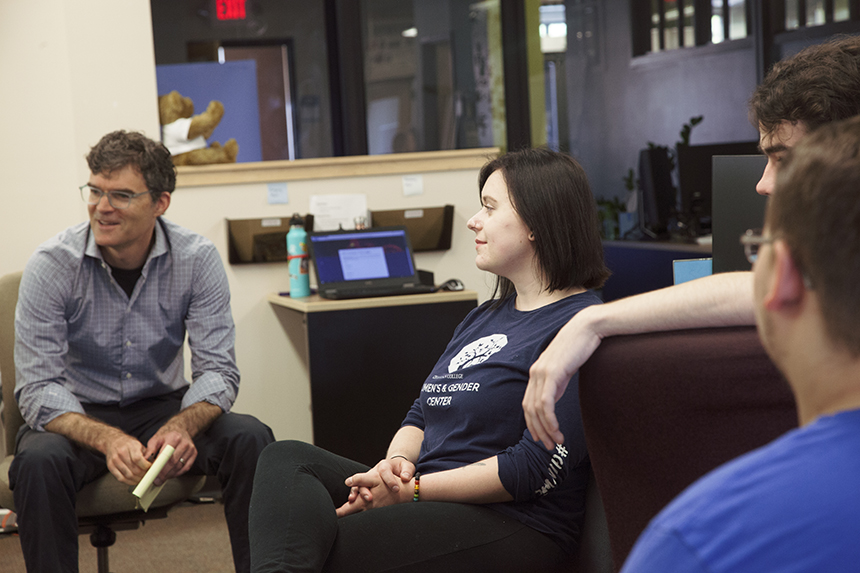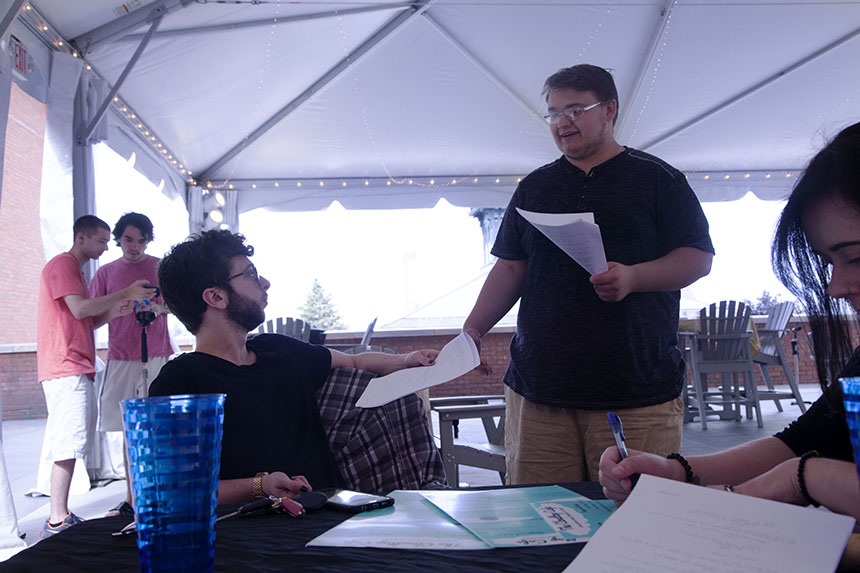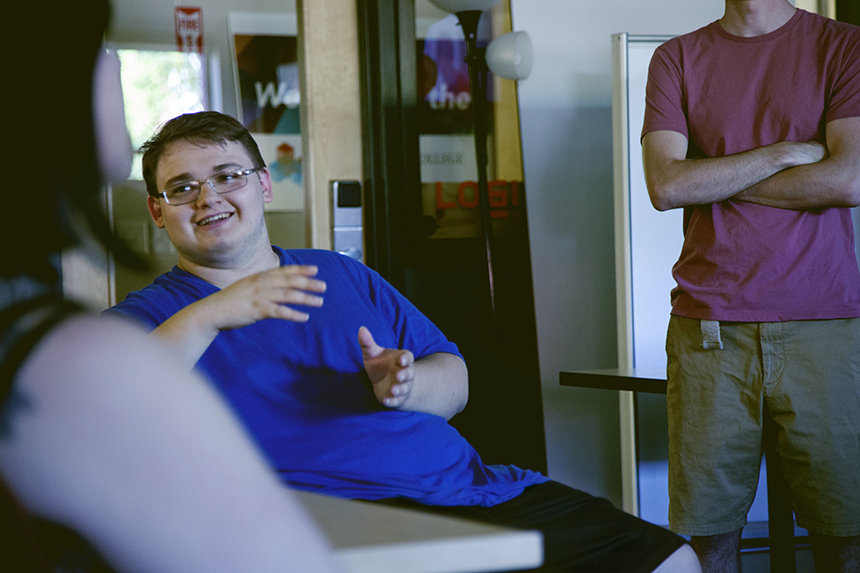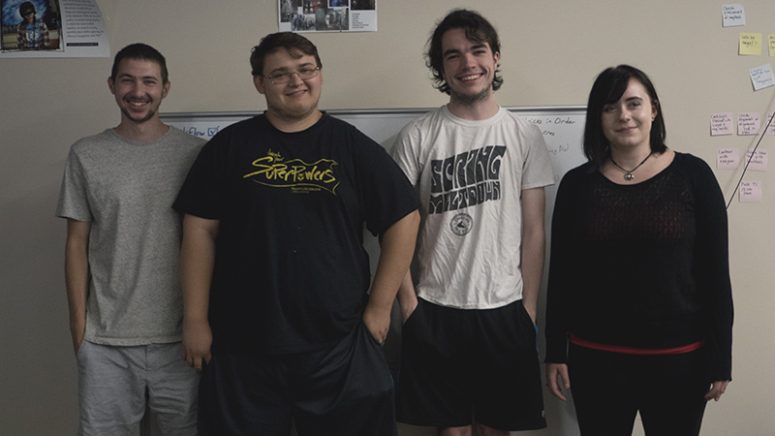By: Alexis Dunn ’19
“I was really excited before I even knew what topic we were doing because I have been really interested in empathy gaming. I play a lot of interactive experiences that aren’t really games but they have a message or are really heavy on dialogue so I was so excited to make that. Experiences like this, with 360 video, are the new medium. It’s this type of thing that goes beyond video games in a way.” (Erika Skorstad ’19, Narrative Designer/ Writer)
Starting new projects at the Emergent Media Center (EMC) is an exciting time for the center because both students and EMC staff are able to take part in whatever a team is creating. From brainstorming to critiquing to testing, it is meant to be a collaborative and team building experience the whole way through. This process is the same for both internal and external client projects. Project Empathy was derived internally as a way to experiment with measuring VR as a tool for evoking empathy.
This Summer started with an orientation day dedicated to helping both new and old team members connect and get the ball rolling on our newest project Empathy. This day also aided in getting the new student staff comfortable with new team members and learning more about how the EMC operates.

Q. During orientation, everyone came up with ideas on how to do a project evoking empathy. Did this exercise help you at all? Did it spark any additional interest or ideas?
A. Mathew Roache ’19, Film Producer: “It definitely helped. We used an idea from each group to develop our idea. Each concept we developed stemmed from one the group presentations during that exercise.”
A. Thomas Reynolds ’19, Programmer and UX Designer: “For me, it helped get me into the mindset of thinking about empathy. It was good to get everybody’s understanding of empathy before we became entrenched within our own processing. We got a lot of perspectives on it really early on.”
A. Joshua Leavitt ’19, Film Producer: “I was interested in gauging what everyone was expecting and what everyone was hoping would be included within a 360 video experience. The activity helped a lot with figuring out what people wanted to see in terms of gameplay aspects and choice.”

The concept of including empathy in videos games has been a rising trend over the past decade or so. Game developers and creators are beginning to write stories that include pieces of them, with messages designed to make the players think beyond gameplay.
“Ryan Green agrees that games are a powerful storytelling tool. Players who grew up speaking the language of video games now desire to use that language to tell their own stories. Games have been waiting for us to grow up into them.” (Eric Bartleson, Control500.com)
However, the Empathy team at the EMC hasn’t been working on just a game. They have been creating a virtual reality, 360 video experience with dialogue choice. They are essentially creating a movie that the user is able to star in. It’s a choose your own adventure story with game-like elements and the sole purpose of allowing the user to try living in someone else’s shoes. Tom Lunday, a third year Game Design student, joined the team as a Programmer to aid in the cross-over from film to game.
Q. How would you describe your project?
A. Tom: “We are conducting an experiment with all of this new, experimental media, to see how we can tell a story and evoke empathy like any traditional storytelling would. But, we want to tell it ‘better’ or in a different, more unique way than traditional methods.”
A. Erika: “We also want to find a way to measure the emotions we are trying to make them feel. More so than if they were reading about someone going through something.”
Q. Why did you choose to use 360 video as your medium?
A. Tom: “It’s not like we were required to but it was definitely heavily implied. We were explicitly asked to use new media like VR and 360 video and AR. For one thing, we have two film majors on this team and I think it would be wasting their talent not to use video like this. We’re also trying to evoke empathy, so we are literally putting the user in someone else’s shoes.”You play as Alex, a young man who has been living with deafness since he was a kid. You meet Alex’s family, and friends, and go through his life dealing with conflicts created by not only his disability, but his family, and those around him who are made uncomfortable by his difference. This project is meant to give the user a new experience, how they choose to live Alex’s life is up to them.
Q. What has it been like creating this character? How far into the backstory did you go?
A. Erika: “I went pretty far. There were a lot of character traits and things that I wrote for myself that you don’t even get to see in the script. I did that with the supporting characters too, like the parents. What are their hobbies, what are they afraid of, what do they like/dislike… things like that. It was really important that we made them feel like real people, not just archetypes or figures that don’t have unique interests.
The Mom is a major source of conflict with you as Alex, but we didn’t want her to be a mean person. She has her reasons and like a person in real life, she’s complex and she has different sides to her.”

Q. Why did you choose hearing loss as your topic? How did you narrow it down in your discussions?
A. Josh: “We all started doing research individually on one or two different projects that we were interested in. We researched PTSD, hearing loss, school shootings, addiction, OCD, memory loss and then we would pitch them to each other, narrow it down, pitch them again, and narrow it down until there were only two left: addiction and hearing loss. We evaluated our time and feedback and we felt that hearing loss would be the most doable and the best option for this particular prototype.
A. Erika: “We didn’t want it to be specifically just about the topic but about an individual’s life. It’s not just to feel empathy because they’re deaf and it’s tough, but to feel empathy because of their family situation and their hearing, and also feel positive empathy because it isn’t just about the negative.”
A. Tom: “That’s what separates it from sympathy, where you just feel bad for somebody. Empathy is more about understanding them and what they are going through. We are trying to tell the whole story.”
The team has been working closely with one of Champlain’s most qualified and experienced professors, Julia Swift. She has directed, written, and filmed for film and TV for a number of years.
Q. What has it been like working with Julia?
A. Mat: “It has been fantastic, especially for me and Josh because we’ve had her as a professor a few times. Outside of a class, it has been a lot of fun and it’s been so helpful.”
A. Josh: “As we’re doing work here, it’s more of a colleague relationship. We’re working together to figure things out instead of going to her as a professor. She’s been very helpful, she brings up a lot of stuff that we don’t necessarily think about. She questions whatever we’re doing.”
A. Erika: “For me, too, it was really helpful. She’s released a book, she’s a writer, she’s done screenwriting and I’ve never done screenwriting before so it was really helpful to have her. She makes you feel that you’re equals and you work together equally.”
A. Tom: “She is very interesting to talk to her because she has so much experience in film and I have some experience in game design and those two fields are so different. To mix those two together has been so interesting, I think, for both of us. She has such an interesting perspective on a lot of things that I never even would have considered. It’s been very cool.”
“So that brings us to the question whether empathy is a genre or rather a game mechanic. There is no easy answer to this one. As long as the creators don’t agree on this, it’s at least a classification on what to expect of these personal games. Vander Caballero describes empathy games like this: ‘In my opinion, an empathy game is simple to define: it’s a game in which conflict resolution is not achieved through power-up mechanics.'” (Eric Bartleson)

Team Empathy has finished the filming portion of their project and has decided to call it Silent Connection. Up next is putting together the pieces and finding the game within the movie. They are also looking forward to getting the prototype ready for its debut at the 2018 South End Art Hop.

